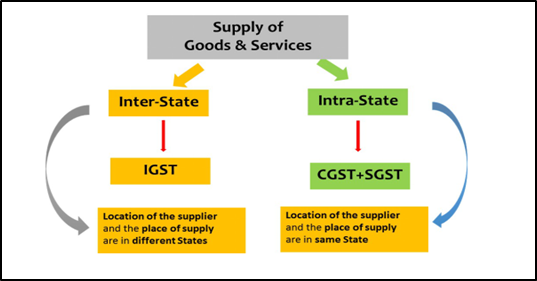In News:
- Ahead of the Goods and Services Tax (GST) Council meeting, the Finance Ministry has notified the Goods and Services Tax (Period of Levy and Collection of Cess) Rules, 2022.
- This has extended the period for levy and collection of GST compensation cess (levied on items in the 28% slab) under the Goods and Services Tax (Compensation to States) Act, 2017, till March, 2026.
What’s in today’s article:
- Goods and Services Tax (About, types, GST council)
- Compensation cess in GST (About, goods covered and where the compensation cess is collected)
- News Summary
Goods and Services Tax (GST):
- About:
- It is an indirect tax (not directly paid by customers to the government), that came into effect from 1 July 2017 through the implementation of the 101st Amendment to the Constitution of India by the Indian government.
- It has actually replaced various indirect taxes such as - service taxes, VAT, excise and others in the country.
- It is levied on the manufacturer or seller of goods and the providers of services.
- The sellers usually add the tax expense into their costs and the price the customers pay is inclusive of GST. Thus, one ends up paying a tax even if s/he is not an income taxpayer.
- It is divided into five different tax slabs for collection of tax - 0%, 5%, 12%, 18% and 28%.
- Types of GST:
- State Goods and Services Tax (SGST): It is charged by the state government for intrastate services and goods transactions and this revenue is generally given to the state.
- Central Goods and Services Tax (CGST): It is also charged for any kind of intrastate transaction of services and goods and it is collected by the central government.
- Integrated Goods and Services Tax (IGST): It is generally charged on some of the inter-state transactions of services and goods and is applied on exports and imports and both the State and Centre governments share this revenue.

- GST Council:
- Article 279A of the Indian Constitution gives power to the President of India to constitute a joint forum of the Centre and States called the GST Council, consisting of the -
- Union Finance Minister - Chairperson
- The Union Minister of State, in-charge of Revenue of finance - Member
- The Minister in-charge of finance or taxation or any other Minister nominated by each State Government - Members
- The GST Council is an apex committee to modify, reconcile or to make recommendations to the Union and the States on GST, like the goods and services that may be subjected or exempted from GST, model GST laws, etc.
- Decisions in the GST Council are taken by a majority of not less than three-fourth of weighted votes cast.
- Centre has one-third weightage of the total votes cast and all the states taken together have two-third of weightage of the total votes cast.
- All decisions taken by the GST Council have been arrived at through
Compensation cess in GST:
- About:
- Compensation cess was introduced as relief for States for the loss of revenues arising from the implementation of GST on 1st July 2017 for a period of five years or such period as recommended by the GST Council.
- States were guaranteed a 14% tax revenue growth in the first five years in exchange for giving up their powers to collect taxes on goods and services after local levies were subsumed under the GST.
- The Fiscal Year 2016 (FY 16 - Base year) tax revenue of the states is used to calculate the 14% growth.
- Any shortfall is supposed to be compensated for by the Centre using funds collected specifically as compensation cess.
- It is levied under the Goods and Services Tax (Compensation to States) Act 2017.
- Goods covered and where the compensation cess is collected:
- Compensation cess is levied on five products considered to be ‘sin’ or luxury goods.
- For example, SUV vehicles (more than 4m) are charged 50% GST, of which the GST tax rate is 28% and the compensation cess is 22%.
- The collected compensation cess flows into the Consolidated Fund of India and then transferred to the Public Account of India, where a GST compensation cess account has been created.
- States are compensated bi-monthly from the accumulated funds in this account.
News Summary:
- The notification extending the levy of GST compensation cess for four more years comes amid demands from several states to extend the compensation period.
- States have argued that the requirements for higher spending and lower revenue during the Covid-19 have damaged their finances and compensation is required to help them overcome the stress.
- According to a recent RBI study, 10 states are facing extreme financial stress, with Punjab, Rajasthan, Kerala, Bengal and Bihar being the most vulnerable.
- The extension is in line with the GST Council decision (last year) to continue compensation cess levy only for repayment of borrowed amounts beyond June 2022.
- The Centre has maintained that the pandemic has resulted in a 4-year extension of the cess and that providing additional compensation is not currently feasible.
- The question of whether states will be compensated after 5 years may be decided at the upcoming GST Council meeting.
- Although expected, the extension will continue to impose a burden on the impacted businesses, particularly in sectors such as automotive, which should be encouraged because it is one of the sectors with a multiplier effect on GDP and employment.










